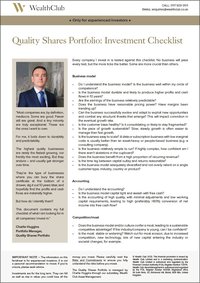Investment philosophy
Most companies are, by definition, mediocre. Some are good. Fewer still are great. And a tiny minority are truly exceptional. These are the ones I want to own.
For me, it boils down to durability and predictability. The highest quality businesses are rarely the fastest growing, nor frankly the most exciting. But they endure – and usually get stronger over time.
Every company I invest in is tested against a checklist: you can download the latest version below. No business will pass every test, but the more ticks the better.
Important: The information on this website is for experienced investors. It is not a personal recommendation to invest. If you’re unsure, please seek advice. Investments are for the long term. They can fall as well as rise in value: you could lose all the money you invest. The Quality Shares Portfolio is managed by Charlie Huggins through our subsidiary, Wealth Club Asset Management.
Find out more about the investment approach
Some factors matter more to me than others. Here are the five key ones I look for:
1. Simplicity
Simple always beats complex in my book, and boring usually beats exciting. I need to understand the accounting and the business model before I invest.
This rules out many businesses for me, including the vast majority of banks, insurers and biotechnology companies.
If I couldn't explain the business to a twelve-year-old, I’m very unlikely to invest.
2. Resilience
History is littered with companies that have quickly lost relevance (think Kodak, Nokia and Debenhams). I want to own businesses that will be thriving 20 years from now.
I’m looking for durable, adaptable and – above all – resilient businesses. Those that can navigate a harsh economic downturn and emerge stronger.
I favour companies selling must-have products, with high levels of recurring income from loyal customers. And a sensible balance sheet is an absolute must.
To assess business resilience, I use the checklist mentioned above. Questions include:
- Is the business largely in charge of its own destiny?
- Do management think like owners?
- Is the company largely immune from changing tastes and fashions?
If a company fails too many of these filters I won’t invest, no matter how good the story or perceived growth prospects.
3. A deep ‘moat’
It’s not a lack of growth opportunities that undoes most businesses – it’s competition. If a business is seen as successful, it will soon attract copycats.
A moat helps protect a business from competitive attack. It can come in many forms – the illustration has examples.

A moat usually results in strong pricing power and high margins, because customers typically have few alternatives. This affords greater protection against inflation.
In short, a moat adds extra resilience, giving a business greater control of its destiny. Every company I invest in needs to have one. The deeper the moat, the better.
4. Exceptional cash generation
I’m a firm believer that revenue is vanity, profit is sanity, but cash is king.
The more cash a business generates, the more options it has, and the less reliant it is on the kindness of strangers (like bankers, who can pull the rug from under your feet when times get tough).
I favour businesses with intangible assets, like brands and software, rather than physical ones like factories. It means they don’t need much money to grow, freeing up cash to:
- Protect their business, for example by improving customer service
- Expand their business, e.g. through bolt-on acquisitions and innovation
- Reward shareholders, through share buybacks and/or dividends
Cash lends resilience to a business and provides the oxygen to grow. I look for companies that generate tonnes of it, in good times and bad.
5. A great culture
Costco’s co-founder, Jim Sinegal, once said: “Culture is not the most important thing, it’s the only thing.” I agree – culture influences all decisions in a business.
Companies with the best cultures are constantly nurturing and reinforcing their moat. They think differently and invest for the long-term. They spend money wisely and find unexpected ways to create value. They tend to be more entrepreneurial, adaptable and durable.
Get the culture of a business right, and everything else tends to look after itself. It’s why I place so much emphasis on trying to understand it.
The strong get stronger
These characteristics are mutually reinforcing.
Companies with great cultures prioritise resilience and cash flow. This cash can be used to deepen the moat, reinforcing resilience and leading to yet higher cash flows.
It’s why I believe the very best businesses tend to get stronger over time. It’s often the most challenging periods when these qualities really come to the fore.

Read more:
Wealth Club aims to make it easier for experienced investors to find information on – and apply for – investments. You should base your investment decision on the offer documents and ensure you have read and fully understand them before investing. The information on this webpage is a marketing communication. It is not advice or a personal or research recommendation to buy any of the investments mentioned, nor does it include any opinion as to the present or future value or price of these investments. It does not satisfy legal requirements promoting investment research independence and is thus not subject to prohibitions on dealing ahead of its dissemination.
The details
- Type
- Discretionary Share Portfolio
- Minimum investment
- £10,000
- Geography
- Global
- Initial charge
- Nil
- Annual custody charge
- 0.25%
- Annual management charge
- 1%
- Next Deadline
- 13 Nov 2024 (5pm)

